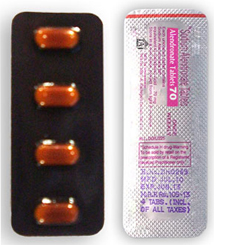|
Alendronate comes as a tablet and a solution (liquid) to take
by mouth. The solution is usually taken on an empty stomach once a
week in the morning. The 5-mg and 10-mg tablets are usually taken
on an empty stomach once a day in the morning, and the 30-mg and
70-mg tablets are usually taken on an empty stomach once a week in
the morning. The 40-mg tablets are usually taken once a day in the
morning for six months to treat Paget's disease of bone. Follow
the directions on your prescription label carefully, and ask your
doctor or pharmacist to explain any part you do not understand.
Take alendronate exactly as directed. Do not take more or less of
it or take it more often than prescribed by your doctor.
Alendronate may not work properly and may damage the esophagus
(tube between the mouth and stomach) or cause sores in the mouth
if it is not taken according to the recommended instructions.
Alendronate has also been tried for treatment of anorexics, who
often have skeletal problems due to malnutrition. However, tests
have not been good and alendronate is not widely used for
anorexics.
A report in the Journal of Clinical Oncology in 2008 stated that
alendronate improves bone density in men having
androgen-deprivation therapy for prostate cancer. This was found
through the results of a double-blind study. The study authors
recommend doctors consider once-a-week alendronate for such
patients.
A large study published in 2006 suggested that some women may be
able to quit taking alendronate after 5 years without increasing
bone fracture risk for another 5 years, but this mode of treatment
is not widely used. Some doctors feel the medicine should be
stopped because of diminishing returns and because of the
possibility (not definitively proven) that the medicine actually
causes too much suppression of bone turnover, resulting in bones
that become brittle along with increase density.
Recent systematic reviews have continued to show that alendronate
reduces the risk of bone fractures. These studies followed women
who took the drug for up to four years.
Interestingly, many doctors recommend against monitoring bone
marrow density in patients on bisphosphonates, at least during the
first three years. The results are thought to be of little value
in determining whether to continue bisphosphonate administration.
The density often continues to decline after the drug is started
(even if the drug is working) and the accuracy of the density
tests is not good enough.
Precautions
Kids don't take this drug (their bones are still growing) and
pregnant women don't take it. Alendronate has side effects, but
overall it is well tolerated.
Elimination
Alendronate is not metabolized by the body and stays in the bones
for years. While it might not be absorbed in the intestine and
eliminate through the feces, alendronate that does enter the
bloodstream has a half-life in the body of over 10 years. It is
not easily flushed out.
|




